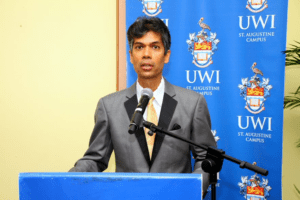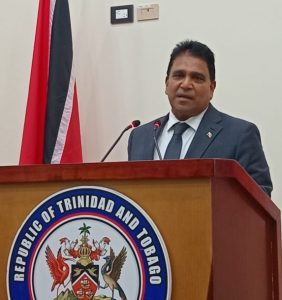
THE annual Emmy Awards, Academy Awards and Golden Globe Awards which are beamed around the world, seems to be subtle attempts to indoctrinate gullible persons into accepting a sub-culture as being refined and civilized.
Not surprisingly, the opening of movies in the US occurs soon after by cinemas in the Caribbean. The patronage of the Caribbean public contribute to these decadent and morally bankrupt productions becoming blockbusters, hits and major money earners.
Few persons in the Caribbean would want to question the morals, ethics and intelligence quotient (IQ) levels of their favourite actors, actresses and artistes who hide behind the bright lights of showbiz and stardom.
They continuously prove that sex appeal and charisma are a good substitute for a serious lack of talent and pathetic acting. Their admirers and sympathisers in the Caribbean people often follow their stars’ exploits on the E! TV cable network and such tabloid shows as Hard Copy, Inside Edition, EXTRA and Access Hollywood.
Furthermore, a minority in the Caribbean also eagerly read the US tabloids such as National Enquirer and the Globe which are available in bookstores and pharmacies. In West Indian malls there are US magazines, such as Bop and Seventeen, which target teenagers. The gossip and fabricated stories on the stars also serve to attract the Caribbean readership many of whom are mostly from the middle and upper class families.
Comics which are sold individually or reprinted in West Indian newspapers also influence gender relations in the Caribbean. For instance, in Blondie the female character is portrayed as a pretty, well-dressed, industrious and middle-class woman. Dagwood is seen as incompetent as he can neither rear children nor understand Blondie. This family setting depicted in Blondie is strikingly similar to the typical Caribbean household in which the man is the breadwinner whilst the wife has the onerous responsibilities of rearing children, cooking, cleaning, purchasing groceries, ironing and washing.
Another familiar illustration is Archie Andrews in the Archie comics. He is a happy-go-lucky bachelor who woos both Veronica and Betty. Interestingly, Betty who plays second fiddle, is always dependable, a good cook and remains faithful to Archie. Despite this attention, he is lovesick by the sight of any new girl in high school or the neighbourhood.
Additionally, Archie constantly competes with Reggie for Veronica’s affection. These scenes closely resemble the life of the typical Caribbean man, single or married, who can comfortably balance more than one relationship. Such storylines in the world of comics serve to reinforce the patriarchal Caribbean society and keep women in a subservient role in the family.
Furthermore, the Caribbean’s young people have identified with such role models as comic book heroes as Spiderman, Superman, Batman and Hulk. These characters in cartoons, comics, movies and television series are constantly battling against evil forces which threaten the world or their existence.

Part of the blame for the stunted Caribbean masculinity is the hollow and puerile minds of the script writers, television producers and distributors. These perpetrators are myopic and see only dollar signs and have no qualms about the high incidence of broken marriages, abused women and emotionally scarred and psychologically traumatised viewers.
The US media’s tentacles have stretched beyond the limits of control and its programming credibility is further strengthened by hypnotized and gullible Caribbean viewers who readily internalize images and false models of the so-called “real” men and women.

The supermodels portrayed in the US media have influenced the image and dietary regimen of Caribbean women. These supermodels project stereotypes of beauty such as full lips, long legs, straight noses, fair skin and tall. Furthermore, the televised Miss Universe and Miss World pageants serve to reinforce these skewed concepts of beauty. As a result Caribbean women are now inclined to undergo expensive and painful liposuction, cosmetic surgery and also suffer from undernourishment with herbal or vitamin diets prescribed by quacks.
Dr Jerome Teelucksingh is an activist. He initiated the inaugural observances of International Day for the Elimination of Violence Against Men and Boys (January 31) and World Day of the Boy Child (May 16). He has made academic presentations at tertiary institutions including Harvard University and Oxford University.
See other articles by Dr Jerome Teelucksingh on AZP News:
Naps Girls: From Humble Beginnings to Excellence
US Media Creates Cultural Dependency in the Caribbean
Bloodless Revolution to Save Lives in Developing Countries
The Need for a Social and Moral Revolution
The Law of Supply and Demand in Developing Countries
End the Dependency for Developing Countries
T&T Carnival and the Emperor’s New Clothes
The Influence of Labour on Caribbean Integration
The illusion of political Unity
Presbyterians in Trinidad: Humble Missionaries, Local Workers
Religious Plurality: Curse or Blessing
Caribbean Youth Need Optimism, Patriotism
Rethinking Identities in Caribbean, Latin America
November 19: All Inclusive International Men’s Day
Should International Agencies be Blamed for Unemployment
A Need to Observe Word Unemployment Day
An Ideology for the Trade Union Movement
The Man who Couldn’t be Prime Minister
Social Outburst vs Social Revolution
Challenges of the Men’s Movement
If George Floyd was Denied Parole
The Meaning of Indian Arrival Day in T&T
International Men’s Day – A Way of Life
Wounds that cause school violence
May Day: A Time for Solidarity, Strength
Who Coined the Term ‘Black Power’
The illusion of political Unity
Presbyterians in Trinidad: Humble Missionaries, Local Workers
Religious Plurality: Curse or Blessing
Caribbean Youth Need Optimism, Patriotism
Rethinking Identities in Caribbean, Latin America
November 19: All Inclusive International Men’s Day
Should International Agencies be Blamed for Unemployment
A Need to Observe Word Unemployment Day
An Ideology for the Trade Union Movement
The Man who Couldn’t be Prime Minister
Social Outburst vs Social Revolution
Challenges of the Men’s Movement
If George Floyd was Denied Parole
The Meaning of Indian Arrival Day in T&T
International Men’s Day – A Way of Life
Wounds that cause school violence
May Day: A Time for Solidarity, Strength
Who Coined the Term ‘Black Power’
![]()












